Baseball’s New Playoff Structure
One League went according to chalk. The other, very much not.
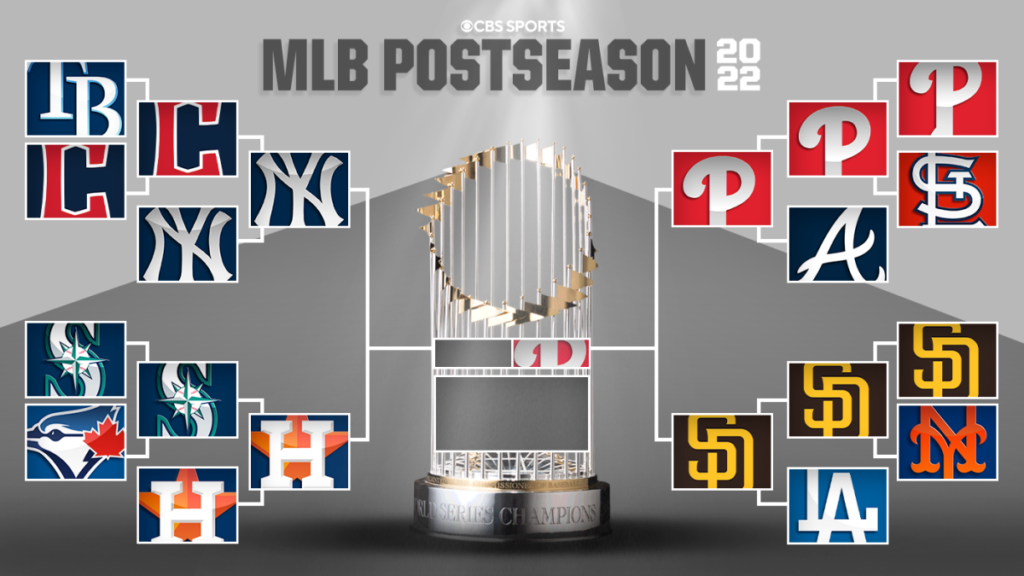
While there was a ten-year period, from roughly my entry into grad school in the summer of 1992 to my moving to the DC area in the summer of 2002, when I was a rabid baseball fan, I have been at best a casual fan in recent years. (The same is true of pro basketball as well.) The reasons are myriad but mostly I just don’t feel I can allocate the time that actively following sports with 162- and 82-game regulars seasons requires.
Regardless, I maintain enough interests in both sports to keep up with them by reading the sports pages. And I find the results of baseball’s new playoff format, implemented this year, fascinating.
Historically, teams in the American and National Leagues played all season to win the “pennant.” The team with the best regular season record won the League and then the two league champions faced off in the World Series for the “world” championship. While there were predecessors to this format going all the way back to 1857, the “modern” era began in 1903 and the format remained essentially unchanged through 1968. While I was alive for the last three iterations of this format, I have no personal recollection of it.*
For the 1969 seasons, for a variety of reasons, both Leagues were divided into East and West divisions. The teams with the best regular season records in the NL East and West played each other in the League Championship Series. Ditto the AL East and West. The two Championship Series winners faced off in the World Series. This is the format that prevailed the first three years that I followed the sport closely.*
Indeed, as an Atlanta Braves fan, I had a direct stake in what turned out to be its demise. The Braves were, for weird reasons, part of the NL West. During the 1993 season, they battled all year to catch the San Francisco Giants. Ultimately, they did, winning 104 games to the Giants’ 103. Despite no other team in the sport having more than 97 wins, the Giants were eliminated from the playoff.
The system changed for the 1994 season. The two leagues realigned into East, Central, and West divisions. The non-division winner in each league with the best record was designated a wild card team and played the divisional champion outside its own division that had the better record in a Division Series and the remaining two teams played in a second Division Series. The winners of the Division Series games advanced to the League Championship Series and those winners advanced to the World Series. That format prevailed through the 2011 season.*
Starting with the 2012 season, the playoff expanded further and, in my mind, in the stupidest way imaginable. A second wild card team was added to both leagues and these teams played in a one-game playoff to reach the Division Series round. A single-game playoff is only slightly more determinative of which team is better at baseball than a coin flip. Even if one team had won ten or fifteen games more over the course of a 162-game season, they played as equals. With the exception of the COVID year, this system prevailed through 2021.
This year, yet another structure went into effect. It’s a substantial improvement, at least in theory, from its predecessor. A third wild card was added to each league. Now, the two division champions with the best records in each league get a first-round bye. The four remaining teams in each league are seeded by record, regardless of whether they are division champions or wild cards, with 1 playing 4 and 2 playing 3 in best-of-three series in the Wild Card round, with the top seed getting home field for all three games. The two Wild Card winners advance to play the two bye teams in a best-of-five Division Series, the winner of which advance to best-of-seven League Championship series and then, finally, a best-of-seven World Series.
The American League standings at the end of the regular season:
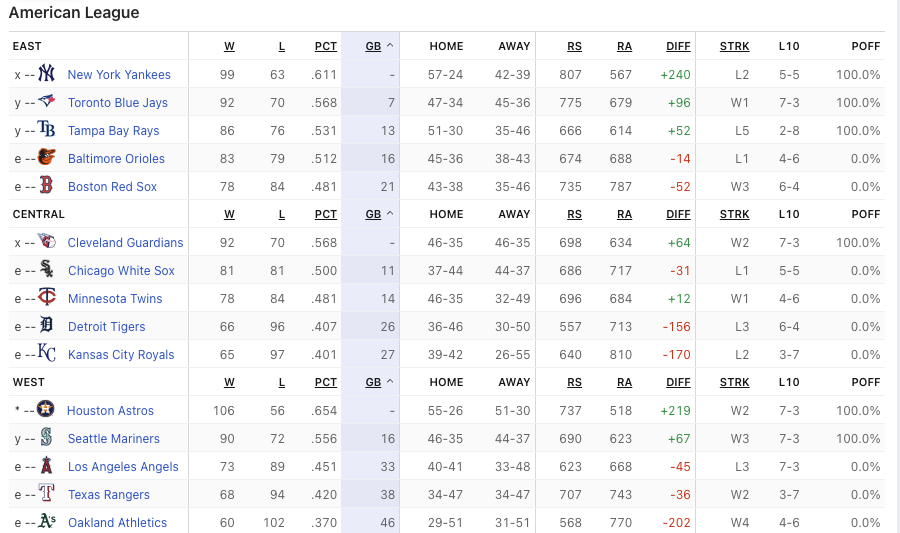
The Astros and Yankees, with far and away the best records, got byes while the 92-win Guardians faced the 86-win Rays and the 92-win Blue Jays played the 90-win Mariners in the Wild Card round. The Guardians and Mariners prevailed; neither could be called an upset.
The Astros went on to oust the Mariners and the Yankees the Guardians. The two bye teams, thus played in the ALCS with the Astros, the team with the best record, sweeping in four games to face the NL winner.
The National League, by contrast, did not go accordingly to chalk. At all. Here were the regular season standings:
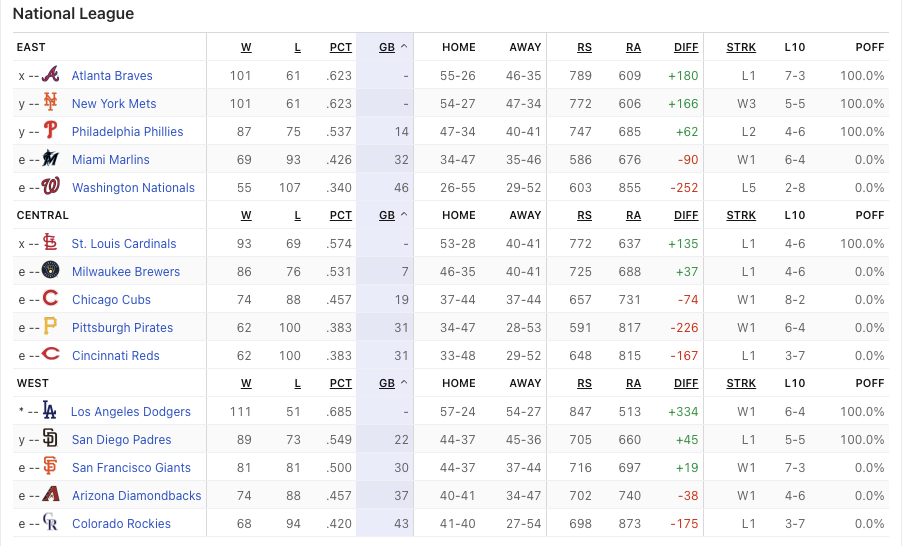
The Dodgers, with the best record in all of baseball, got a bye as did the Braves.
In the WildCard round, the 93-win Cardinals hosted the 87-win Phillies and lost. The 101-win Mets, which led their division until the final weekend, hosted to 89-win Padres and lost.
In the Division Series, the 111-win Dodgers lost to the 89-win Padres in four games and the 101-win Braves, winner of the East, lost to the 87-win Phillies, who finished in third place, also in four games.
So, the NLCS pitted a team that finished 22 games down in their division against a team that finished 14 games down in theirs. The latter won in five games.
The World Series starts Friday in Houston. The Astros were heavily favored before the playoffs started and should be even more heavily favored now. Then again, the Phillies are on quite a hot streak.
My initial assessment is that this format is far superior to the one it replaced. One-game playoffs are required in football but stupid in games as erratic as baseball and basketball.
And I very much like rewarding the teams with the best record over a grueling 162-game season with byes into the Division Series. With byes, there has long been talk of “rust.” There’s a sense that hitters, especially, lose their rhythm from the layoff. It didn’t seem to effect the Astros or Yankees but the Dodgers and Braves certainly underperformed. But, again, I think the benefits outweigh the risks.
While I understand that logistics (most notably weather and competition with the NFL and college football) mitigate against it, I would prefer all series be seven games and at minimum five. Best-of-three beats a single-game contest but not by much.
____________
*There were some occasional variations from these formats owing to world wars, labor disputes, and a pandemic.

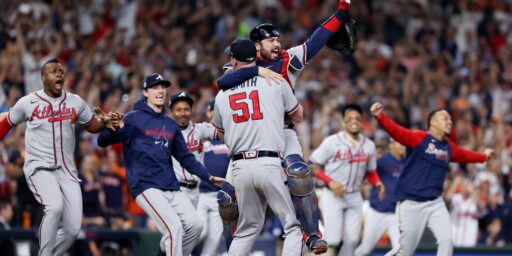



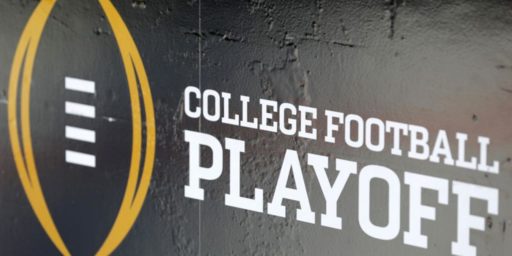
As a Phillies fan I am pretty happy with it. More seriously, what the bye does which I think offsets the rust issue is let the bye teams set up their pitching rotations, especially with the lack of breaks. At this level most teams have 2 aces, maybe 3. Means that after the first round the winners are starting their aces on very short rest, which teams largely dont do anymore, or you lead off with your number 3 starter or have a bullpen game.
Houston has monster of a team. Not sure how they didnt win more games. That’s the only reason I think Phillies might have a chance since it seems they go through stretches of not playing up to their abilities.
Steve
A agree with you regarding the mercurial nature of a 7 game series; it’s a coin flip. The problem is there are two competing issues. If we went back to the pre 1968 era you have what you want in terms of insuring that the two best teams in each league get to the World Series. You still have a problem with the issue if one league has two or three teams with 100 + game wins and the other has a winner in the 90 game category. But the bigger problem is the regular season could be over in one or both leagues as much as 2 or three weeks if they have runaway winners.
The playoff schemes are all about making the last month of the season interesting. So yes, the current scheme addresses that but you can get outcomes like you mentioned in the post. Those two goals are fundamentally incompatible. The closest you could get might be having a 4 team playoff, with 1 & 2 and 3 & 4squaring off guaranteeing that one of the season winners will be in the World Series. The draw back is that still doesn’t really help the end of the season issue that much and you can still have a situation where a team with substantially fewer regular season wins is crowned champion.
My preference would be ditching the division structure all together and building the season schedule based on last years performance (like the NFL), and having the two op performing teams meet in a 7 game league series and then the winners meet in the World series. I get that it makes the end of the season dull in many cases but you can’t have both. Either that or cut the length of the regulars season and a four round playoff scheme (7 game series) that involves 16 teams al la the NBA and NHL I personally wouldn’t care for this idea but not so much that it would stop me from engaging with it at all.
A 5 game series are not helpful, but only very slightly less subject to random chance then a 7 game series. The purest way to to do it is to crown the team with the most regular season wins champion but you lose a lot of drama and the big payday that a championship series brings.
Yes, 7 game series would be best, but only be accomplished by returning to a 154 game season and that won’t happen. As pennant races switched to determining WS participation to playoff seeding, the risk of a mediocre teams reaching the WS increased and the beauty of 7 game series minimizes that.
I agree on the 7-game playoffs all around. More games ultimately spells more money for the owners which is always the best possible outcome in a corporatist society such as ours.
Hey, I’m still trying to figure out why they let us build an open-air ball park here in Denver. Just looking at the last decade, we’ve had significant snow events as late (in the storm season) as mid-May, and as early as mid-September.
I am compelled to mention an aside to the MLB Playoff format. The unbeliveably unnecessary and obnoxious “ghost runner” rule that starts a runner on second base before a batter comes to the plate in the tenth inning during the regular season is mercifully not used in the playoffs.
(I enjoyed every pitch of the 18 inning, 6 hour 22 minute, 1-0 victory by the Astros over the Mariners)
Now if the MLB would reconsider the proposed “pitch clock” that will scar the game even more next season…of course they won’t. What am I thinking.
The only use of a timepiece in baseball that I have ever thought was useful was when Red Barber mentioned in one of his books about how when he was doing radio broadcasts he would set an egg timer next to the microphone. It would run out every three minutes. He would turn it over and give the score of the game.
The Yankees offense was terrible throughout the playoffs. They hit. 212 against Cleveland. But the Guardians are not good offensively.
Against Houston they were just as bad.
I hate all the wildcard nonsense. Unlike FB, with less than 20 games, records should matter in BB, not how hot you are at the end of the year.
@BugManDan:
The Yanks offense problem is relying too much on the long ball, the same problem that has haunted them since at least 2018. If there is one thing that good pitching can do, is take away the home run and playoff teams will have good pitching. That team doesn’t do a good job at manufacturing runs, they don’t practice situational hitting or run the bases particularly well.
@BugManDan:
The problem is that, without wild cards, you can eliminate the 2nd best team in a league—or even in baseball—from the playoffs because the best team is in their division. The Braves have been involved in at least two such instances, although both times prevailing to win the division. But the 1993 Giants and the 2022 Mets deserved a playoff spot. I’m less sure that was true of the 2022 Phillies, who finished a distant third in the division, but they did indeed got hot at the right time.
@Sleeping Dog:
“The Yanks offense problem is relying too much on the long ball, the same problem that has haunted them since at least 2018.”
This is hardly unique to the Yankees. Most teams seem to train their players to swing for the fences on every swing, and if they strike out twice per game, that doesn’t matter. It’s like current thinking is to make Dave Kingman the person to emulate.